诗篇125篇最佳一节金句
诗词名句-语文高考-高考作文必备_作文高分_点睛之句sqfx
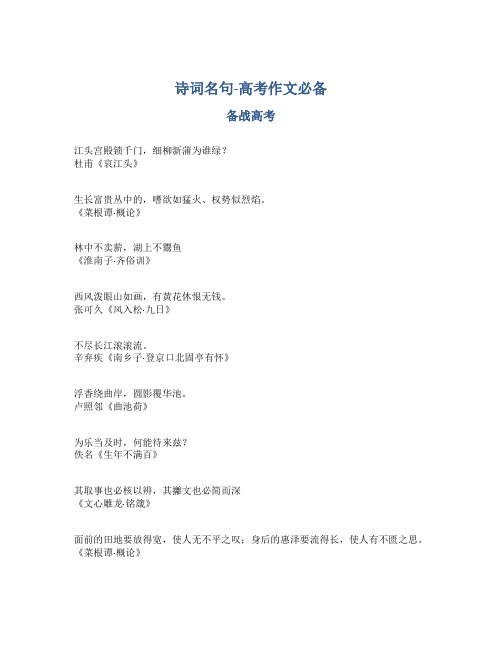
诗词名句-高考作文必备备战高考江头宫殿锁千门,细柳新蒲为谁绿?杜甫《哀江头》生长富贵丛中的,嗜欲如猛火、权势似烈焰。
《菜根谭·概论》林中不卖薪,湖上不鬻鱼《淮南子·齐俗训》西风泼眼山如画,有黄花休恨无钱。
张可久《风入松·九日》不尽长江滚滚流。
辛弃疾《南乡子·登京口北固亭有怀》浮香绕曲岸,圆影覆华池。
卢照邻《曲池荷》为乐当及时,何能待来兹?佚名《生年不满百》其取事也必核以辨,其攡文也必简而深《文心雕龙·铭箴》面前的田地要放得宽,使人无不平之叹;身后的惠泽要流得长,使人有不匮之思。
《菜根谭·概论》俱怀逸兴壮思飞,欲上青天揽明月。
李白《宣州谢脁楼饯别校书叔云》晴烟漠漠柳毵毵,不那离情酒半酣。
韦庄《古离别》身闲不睹中兴盛,羞逐乡人赛紫姑。
李商隐《正月十五夜闻京有灯恨不得观》国无常强,无常弱。
奉法者强,则国强;奉法者弱,则国弱。
《韩非子·有度》人生天地间,忽如远行客。
佚名《青青陵上柏》天将降大任于是人也,必先苦其心志,劳其筋骨,饿其体肤,空乏其身,行拂乱其所为《孟子·告子章句下·第十五节》庖有肥肉,厩有肥马,民有饥色,野有饿莩,此率兽而食人也。
《孟子·梁惠王章句上·第四节》砌下落梅如雪乱,拂了一身还满。
李煜《清平乐·别来春半》非我而当者,吾师也;是我而当者,吾友也;谄谀我者,吾贼也。
《荀子·修身》目见百步之外,不能自见其眦。
《淮南子·说林训》绝巘多生怪柏,悬泉瀑布,飞漱其间,清荣峻茂,良多趣味。
郦道元《三峡》逢人不说人间事,便是人间无事人。
杜荀鹤《赠质上人》山色横侵蘸晕霞,湘川风静吐寒花。
苏轼《浣溪沙·山色横侵蘸晕霞》将飞更作回风舞,已落犹成半面妆。
宋祁《落花》仁人之于弟也,不藏怒焉,不宿怨焉,亲爱之而已矣。
《孟子·万章章句上·第三节》翻空白鸟时时见,照水红蕖细细香。
诗词名句-语文高考-高考作文必备_作文高分_点睛之句sqji
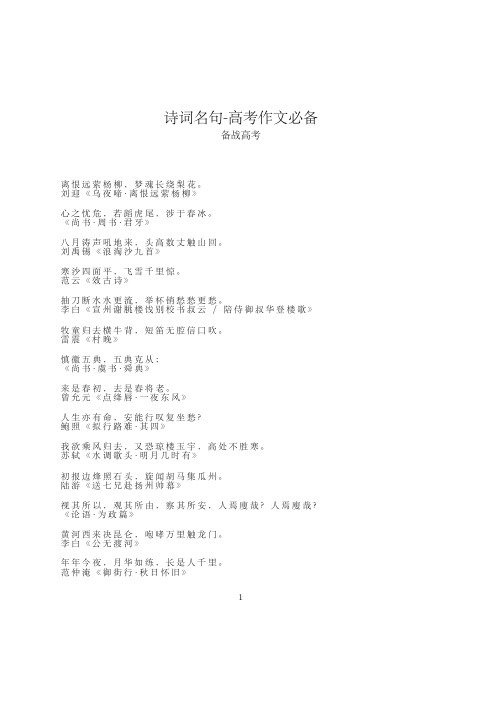
诗词名句-高考作文必备备战高考离恨远萦杨柳,梦魂长绕梨花。
刘迎《乌夜啼·离恨远萦杨柳》心之忧危,若蹈虎尾,涉于春冰。
《尚书·周书·君牙》八月涛声吼地来,头高数丈触山回。
刘禹锡《浪淘沙九首》寒沙四面平,飞雪千里惊。
范云《效古诗》抽刀断水水更流,举杯销愁愁更愁。
李白《宣州谢脁楼饯别校书叔云/陪侍御叔华登楼歌》牧童归去横牛背,短笛无腔信口吹。
雷震《村晚》慎徽五典,五典克从;《尚书·虞书·舜典》来是春初,去是春将老。
曾允元《点绛唇·一夜东风》人生亦有命,安能行叹复坐愁?鲍照《拟行路难·其四》我欲乘风归去,又恐琼楼玉宇,高处不胜寒。
苏轼《水调歌头·明月几时有》初报边烽照石头,旋闻胡马集瓜州。
陆游《送七兄赴扬州帅幕》视其所以,观其所由,察其所安,人焉廋哉?人焉廋哉?《论语·为政篇》黄河西来决昆仑,咆哮万里触龙门。
李白《公无渡河》年年今夜,月华如练,长是人千里。
范仲淹《御街行·秋日怀旧》1粽包分两髻,艾束著危冠。
陆游《乙卯重五诗》一杯酒,问何似,身后名?辛弃疾《水调歌头·壬子三山被召陈端仁给事饮饯席上作》君子尊德性,而道问学,致广大,而尽精微,极高明,而道中庸。
温故,而知新,敦厚以崇礼。
《中庸·第二十七章》善在身,介然必以自好也;不善在身,菑然必以自恶也。
《荀子·修身》想雁空、北落冬深,澹墨晚天云阔。
吴文英《暗香疏影·夹钟宫赋墨梅》事丰奇伟,辞富膏腴,无益经典而有助文章。
《文心雕龙·正纬》竹马踉蹡冲淖去,纸鸢跋扈挟风鸣。
陆游《观村童戏溪上》日日思君不见君,共饮长江水。
李之仪《卜算子·我住长江头》柔情似水,佳期如梦,忍顾鹊桥归路。
秦观《鹊桥仙·纤云弄巧》记当日、门掩梨花,翦灯深夜语。
史达祖《绮罗香·咏春雨》仁者爱万物而智者备祸於未形,不仁不智,何以为国?《史记·赵世家》多情只有春庭月,犹为离人照落花。
诗篇金句背诵
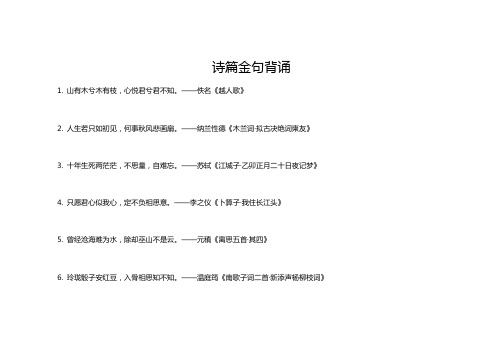
诗篇金句背诵1. 山有木兮木有枝,心悦君兮君不知。
——佚名《越人歌》2. 人生若只如初见,何事秋风悲画扇。
——纳兰性德《木兰词·拟古决绝词柬友》3. 十年生死两茫茫,不思量,自难忘。
——苏轼《江城子·乙卯正月二十日夜记梦》4. 只愿君心似我心,定不负相思意。
——李之仪《卜算子·我住长江头》5. 曾经沧海难为水,除却巫山不是云。
——元稹《离思五首·其四》6. 玲珑骰子安红豆,入骨相思知不知。
——温庭筠《南歌子词二首·新添声杨柳枝词》7. 愿得一心人,白头不相离。
——卓文君《白头吟》8. 平生不会相思,才会相思,便害相思。
——徐再思《折桂令·春情》9. 去年今日此门中,人面桃花相映红。
——崔护《题都城南庄》山无陵,江水为竭。
冬雷震震,夏雨雪。
天地合,乃敢与君绝。
——佚名《上邪》11. 入我相思门,知我相思苦。
——李白《三五七言·秋风词》12. 人生自是有情痴,此恨不关风与月。
——欧阳修《玉楼春·尊前拟把归期说》13. 人生如逆旅,我亦是行人。
——苏轼《临江仙·送钱穆父》14. 两情若是久长时,又岂在朝朝暮暮。
——秦观《鹊桥仙·纤云弄巧》15. 问世间,情为何物,直教生死相许?——元好问《摸鱼儿·雁丘词/ 迈陂塘》16. 一往情深深几许?深山夕照深秋雨。
——纳兰性德《蝶恋花·出塞》17. 花自飘零水自流。
一种相思,两处闲愁。
——李清照《一剪梅·红藕香残玉簟秋》18. 执子之手,与子偕老。
——佚名《击鼓》19. 一日不见兮,思之如狂。
——司马相如《凤求凰·琴歌》身无彩凤双飞翼,心有灵犀一点通。
——李商隐《无题·昨夜星辰昨夜风》21. 林花谢了春红,太匆匆。
无奈朝来寒雨,晚来风。
——李煜《相见欢·林花谢了春红》22. 雨打梨花深闭门,忘了青春,误了青春。
经典唐诗100金句
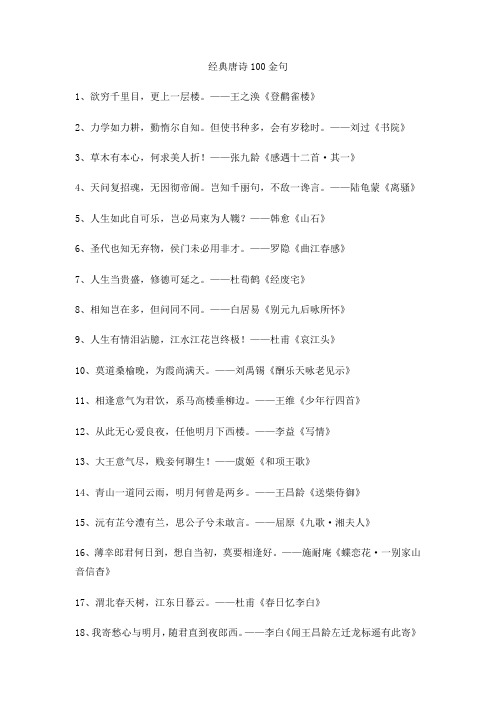
经典唐诗100金句1、欲穷千里目,更上一层楼。
——王之涣《登鹳雀楼》2、力学如力耕,勤惰尔自知。
但使书种多,会有岁稔时。
——刘过《书院》3、草木有本心,何求美人折!——张九龄《感遇十二首·其一》4、天问复招魂,无因彻帝阍。
岂知千丽句,不敌一谗言。
——陆龟蒙《离骚》5、人生如此自可乐,岂必局束为人鞿?——韩愈《山石》6、圣代也知无弃物,侯门未必用非才。
——罗隐《曲江春感》7、人生当贵盛,修德可延之。
——杜荀鹤《经废宅》8、相知岂在多,但问同不同。
——白居易《别元九后咏所怀》9、人生有情泪沾臆,江水江花岂终极!——杜甫《哀江头》10、莫道桑榆晚,为霞尚满天。
——刘禹锡《酬乐天咏老见示》11、相逢意气为君饮,系马高楼垂柳边。
——王维《少年行四首》12、从此无心爱良夜,任他明月下西楼。
——李益《写情》13、大王意气尽,贱妾何聊生!——虞姬《和项王歌》14、青山一道同云雨,明月何曾是两乡。
——王昌龄《送柴侍御》15、沅有芷兮澧有兰,思公子兮未敢言。
——屈原《九歌·湘夫人》16、薄幸郎君何日到,想自当初,莫要相逢好。
——施耐庵《蝶恋花·一别家山音信杳》17、渭北春天树,江东日暮云。
——杜甫《春日忆李白》18、我寄愁心与明月,随君直到夜郎西。
——李白《闻王昌龄左迁龙标遥有此寄》19、白首相知犹按剑,朱门先达笑弹冠。
——王维《酌酒与裴迪》20、古路无行客,寒山独见君。
——刘长卿《碧涧别墅喜皇甫侍御相访》21、世故多离别,良宵讵可逢。
——皇甫冉《秋夜宿严维宅》22、离别家乡岁月多,归来人事半消磨。
——贺知章《回乡偶书二首其一》23、江渚秋风至,他乡离别心。
——张九龄《初秋忆金均两弟》24、上言离别久,下言望应归。
——何逊《门有车马客》25、悲莫悲生离别,乐莫乐新相识,儿女古今情。
——辛弃疾《水调歌头·壬子三山被召陈端仁给事饮饯席上作》26、莫道秋江离别难,舟船明日是长安。
——王昌龄《重别李评事》27、此身如传舍,何处是吾乡。
诗词名句-语文高考-高考作文必备_作文高分_点睛之句qjup

诗词名句-高考作文必备备战高考请君试问东流水,别意与之谁短长。
李白《金陵酒肆留别》劳劳燕子人千里,落落梨花雨一枝。
张炎《鹧鸪天·楼上谁将玉笛吹》野桥梅几树,并是白纷纷。
洪升《雪望》可怜今夕月,向何处、去悠悠。
辛弃疾《木兰花慢·中秋饮酒将旦客谓前人诗词有赋待月无送月者因用天问体赋》问嫦娥、孤令有愁无?应华发。
辛弃疾《满江红·中秋寄远》运筹千里,勇冠三军《旧唐书·列传·卷三》千里之马时一有,其利缓;驽马日售,其利急。
《韩非子·说林下》天长地久有时尽,此恨绵绵无绝期。
白居易《长恨歌》东风洒雨露,会入天地春。
李白《送郄昂谪巴中》水色渌且明,令人思镜湖。
李白《登单父陶少府半月台》秋阴不散霜飞晚,留得枯荷听雨声。
李商隐《宿骆氏亭寄怀崔雍崔衮》白雪关山远,黄云海戍迷。
李白《紫骝马》小人之誉人,反为损。
《淮南子·说山训》离别家乡岁月多,近来人事半消磨。
贺知章《回乡偶书二首》明镜所以照形,往事所以知今。
《后汉书·列传·冯岑贾列传》白马金羁辽海东,罗帷绣被卧春风。
李白《春怨》提笼忘采叶,昨夜梦渔阳。
张仲素《春闺思》月出皎兮,佼人僚兮。
佚名《月出》积学以储宝,酌理以富才《文心雕龙·神思》结交在相知,骨肉何必亲。
佚名《箜篌谣》东风吹水日衔山,春来长是闲。
李煜《阮郎归·呈郑王十二弟》卧牛吹短笛,耕却傍溪田。
崔道融《牧竖》谁言千里自今夕,离梦杳如关塞长。
薛涛《送友人》乱离何处见,消息苦难真。
吴伟业《遇旧友》故垒西边,人道是,三国周郎赤壁。
苏轼《念奴娇·赤壁怀古》投我以桃,报之以李。
《墨子·16章兼爱(下)》日暮酒醒人已远,满天风雨下西楼。
许浑《谢亭送别》淡淡梅花香欲染,丝丝柳带露初干。
曹雪芹《香菱咏月·其二》岂曰无衣?与子同袍。
佚名《秦风·无衣》疏篱曲径田家小。
云树开清晓。
周邦彦《虞美人·疏篱曲径田家小》欲为圣明除弊事,肯将衰朽惜残年!韩愈《左迁至蓝关示侄孙湘》刑称罪,则治;不称罪,则乱。
古诗文名句五百(1-175)教材

古诗文名句五百1. 关关雎鸠,在河之洲。
窈窕淑女,君子好逑。
(诗经·周南·关雎)①关关:水鸟鸣叫的声音。
雎(ju)鸠:一种水鸟。
②洲:水中的陆地。
③窈窕(yao tiao):内心,外貌美好的样子。
淑:好,善。
④君子:这里指女子对男子的尊称。
逑(qiu):配偶。
《诗经》第一篇2. 昔我往矣,杨柳依依;今我来思,雨雪霏霏。
(诗经·小雅·采薇)往日离家出征,杨柳轻柔,随风而舞。
如今返回故乡,纷纷雪花,漫天飘飞。
这是一首写一位被遣戍边的兵士从出征到回家的诗歌。
3. 知我者,谓我心忧,不知我者,谓我何求。
(诗经·王风·黍离)知我者:了解我的心情的;谓我何求:认为我久留不去,有什么要求。
4. 如切如磋,如琢如磨。
(诗经·卫风·淇奥)就好像切制,就好像锉平,就好像雕琢,就好像磨光。
切磋琢磨(qiē cuō zhuó mó):本来指把骨头、象牙、玉石、石头等加工制成器物的动作。
形容文采好,有修养。
5. 一日不见,如三秋兮。
(诗经·王风·采葛)‚三秋‛,这是指三个季度,用这种夸张之词形容主人公对友人的殷切思念,实是情至之语。
6. 青青子衿,悠悠我心。
(诗经·郑风·子衿)子衿:周代读书人的服装。
子,第二人称代词,‚你‛。
衿:即襟,衣领。
青青的是你的衣领,悠悠的是我的心境。
这首诗写一个男子在城楼上等候他的恋人。
7. 所谓伊人,在水一方。
(诗经·秦风·蒹葭[jiān jiā])原诗描写所思念的人远在彼方,由于受阻,总是可望而不可及,表达了主人公对伊人的深刻思念。
这两句意即我那心上人儿,她远在水的另一方。
‚在水一方‛是隔绝不通的一种象征,目的在于能够写出主人公心之所存与目之所望的一致。
因此这两句不妨看作望穿秋水,仍不见伊人踪影的抒情主人公心灵的叹息。
8. 巧笑倩兮,美目盼兮。
加尔文《诗篇注释》 125篇

加尔文《诗篇注释》125篇诗篇注释125加尔文由于信徒与恶人一同混杂在这个世界,他们似乎面临生活的一切艰难困苦,先知将他们与耶路撒冷相比,这表明他们有无往而不胜的保障保护着。
如果上帝允许他们遭受恶人的折磨苦待,他劝勉说他们大有盼望。
但他同时也区分了真假以色列人,假冒为善者不能享受这里所论到的属于义人的安全。
上行之诗。
125:1-21.倚靠耶和华的人,好像锡安山,永不动摇(fe79)。
2. 众山怎样围绕耶路撒冷,耶和华也照样围绕他的百姓,从今时直到永远。
1.倚靠耶和华的人,好像锡安山。
这首诗与上一首的不同在于,圣灵在上一首告诉我们,教会靠着上帝的大能一直得蒙保守,没有任何人的作为;在这一首则教导我们,在未来的日子里教会依然绝对安全,因为她是在上帝战无不胜的大能保护之下。
当用教会象征耶路撒冷圣城时,先知的思路是要鼓励每一个信徒相信,上帝向全体选民所应许的安全是属于他的。
但是为了让人看见教会有形的形象,先知教导说那些在肉身里浑浑噩噩的野蛮人,他们将继续在世上存留。
这样,我们首先应当注意的是,对那些没有凭着信心充分理解上帝在暗中施行保护的人而言,环绕耶路撒冷的群山就是一面镜子,他们会从这面镜子清楚看到,教会也是安然无恙,好像她的四周全是围墙和护拦。
而且,明白我上面所说的很有益处,即每当上帝对他全体百姓说话时,他也是在对每一个特定的人说话。
由于许多应许都普遍扩展到针对全体教会,所以很多人以为这些应许离自己很远很远,以为它们与自己无关。
必须注意这里所定的规则,即无论上帝向教会普遍应许的是什么,每个人都要将此应用于自己。
诗人用耶路撒冷代表教会绝非无缘无故,因为至圣所与约柜都在那里。
至于对字词的解释,应当注意到第一节中的后两个动词有两种理解。
其一,这两个动词的主语都是耶路撒冷。
其二,前一个动词al lo yimmot指绝不动摇,仅用于说到耶路撒冷时;至于后一个动词yesheb指持久不变,用于指信徒,根据这种观点,数目上有变化,即单数的yesheb代替了复数的yeshbu,这种变化在希伯来人中很常见。
诗词名句-语文高考-高考作文必备_作文高分_点睛之句mcjv
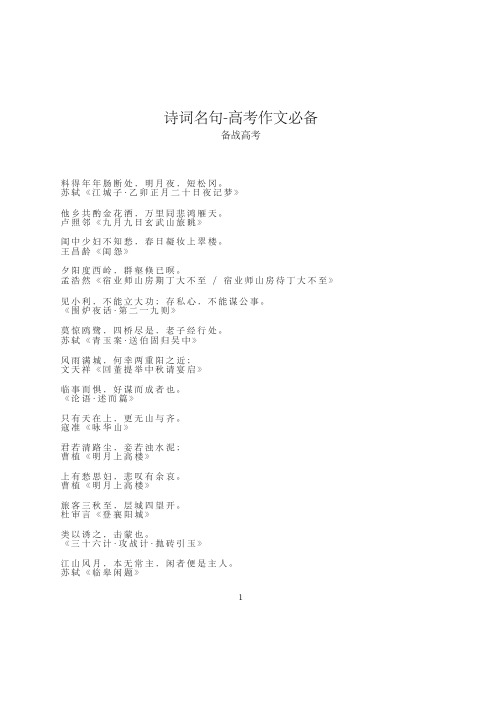
诗词名句-高考作文必备备战高考料得年年肠断处,明月夜,短松冈。
苏轼《江城子·乙卯正月二十日夜记梦》他乡共酌金花酒,万里同悲鸿雁天。
卢照邻《九月九日玄武山旅眺》闺中少妇不知愁,春日凝妆上翠楼。
王昌龄《闺怨》夕阳度西岭,群壑倏已暝。
孟浩然《宿业师山房期丁大不至/宿业师山房待丁大不至》见小利,不能立大功;存私心,不能谋公事。
《围炉夜话·第二一九则》莫惊鸥鹭,四桥尽是,老子经行处。
苏轼《青玉案·送伯固归吴中》风雨满城,何幸两重阳之近;文天祥《回董提举中秋请宴启》临事而惧,好谋而成者也。
《论语·述而篇》只有天在上,更无山与齐。
寇准《咏华山》君若清路尘,妾若浊水泥;曹植《明月上高楼》上有愁思妇,悲叹有余哀。
曹植《明月上高楼》旅客三秋至,层城四望开。
杜审言《登襄阳城》类以诱之,击蒙也。
《三十六计·攻战计·抛砖引玉》江山风月,本无常主,闲者便是主人。
苏轼《临皋闲题》1牧竖持蓑笠,逢人气傲然。
崔道融《牧竖》何期小会幽欢,变作离情别绪。
柳永《昼夜乐·洞房记得初相遇》虽有兄弟,不如友生?佚名《常棣》秋气堪悲未必然,轻寒正是可人天。
杨万里《秋凉晚步》太乙近天都,连山接海隅。
王维《终南山》声中如告诉,未尽反哺心。
白居易《慈乌夜啼》谁做冰壶凉世界,最怜玉斧修时节。
辛弃疾《满江红·中秋寄远》彼其之子,美无度。
佚名《汾沮洳》棠梨花映白杨树,尽是死生别离处。
白居易《寒食野望吟》子规夜半犹啼血,不信东风唤不回。
王令《送春》寻常一样窗前月,才有梅花便不同。
杜耒《寒夜》千古江山,英雄无觅孙仲谋处。
辛弃疾《永遇乐·京口北固亭怀古》升沉应已定,不必问君平。
李白《送友人入蜀》鸟啼花落人何在,竹死桐枯凤不来。
崔珏《哭李商隐》药医不死病,佛度有缘人。
《醒世恒言·卷十》风引龙虎旗,歌钟昔追攀。
李白《登邯郸洪波台置酒观发兵》我善养吾浩然之气。
《孟子·公孙丑章句上·第二节》东城渐觉风光好。
诗词名句-语文高考-高考作文必备_作文高分_点睛之句mjeg
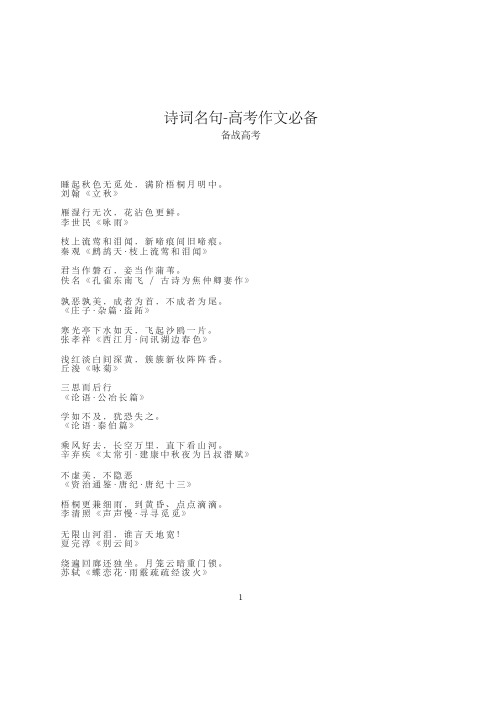
诗词名句-高考作文必备备战高考睡起秋色无觅处,满阶梧桐月明中。
刘翰《立秋》雁湿行无次,花沾色更鲜。
李世民《咏雨》枝上流莺和泪闻,新啼痕间旧啼痕。
秦观《鹧鸪天·枝上流莺和泪闻》君当作磐石,妾当作蒲苇。
佚名《孔雀东南飞/古诗为焦仲卿妻作》孰恶孰美,成者为首,不成者为尾。
《庄子·杂篇·盗跖》寒光亭下水如天,飞起沙鸥一片。
张孝祥《西江月·问讯湖边春色》浅红淡白间深黄,簇簇新妆阵阵香。
丘浚《咏菊》三思而后行《论语·公冶长篇》学如不及,犹恐失之。
《论语·泰伯篇》乘风好去,长空万里,直下看山河。
辛弃疾《太常引·建康中秋夜为吕叔潜赋》不虚美,不隐恶《资治通鉴·唐纪·唐纪十三》梧桐更兼细雨,到黄昏、点点滴滴。
李清照《声声慢·寻寻觅觅》无限山河泪,谁言天地宽!夏完淳《别云间》绕遍回廊还独坐。
月笼云暗重门锁。
苏轼《蝶恋花·雨霰疏疏经泼火》1今日江头两三树,可怜和叶度残春。
元稹《离思五首》宁谢纷华而甘淡泊,遗个清名在乾坤。
《菜根谭·概论》天相汉,民怀国。
史达祖《满江红·九月二十一日出京怀古》红莲相倚浑如醉,白鸟无言定自愁。
辛弃疾《鹧鸪天·鹅湖归病起作》地不知寒人要暖,少夺人衣作地衣。
白居易《红线毯》能胜强敌者,先自胜者也。
《商君书·画策》桃李风前多妩媚,杨柳更温柔。
辛弃疾《武陵春·桃李风前多妩媚》除却天边月,没人知。
韦庄《女冠子·四月十七》红深绿暗径相交,抱暖含芳披紫袍。
温庭筠《寒食日作》外湖莲子长参差,霁山青处鸥飞。
张先《画堂春·外湖莲子长参差》君见恶,则群臣匿端;君见好,则群臣诬能。
《韩非子·二柄》闻道皇华使,方随皂盖臣。
王维《送李判官赴东江》桃花落。
闲池阁。
山盟虽在,锦书难托。
陆游《钗头凤·红酥手》越王勾践破吴归,义士还乡尽锦衣。
加尔文《诗篇注释》 125篇

加尔文《诗篇注释》125篇诗篇注释125加尔文由于信徒与恶人一同混杂在这个世界,他们似乎面临生活的一切艰难困苦,先知将他们与耶路撒冷相比,这表明他们有无往而不胜的保障保护着。
如果上帝允许他们遭受恶人的折磨苦待,他劝勉说他们大有盼望。
但他同时也区分了真假以色列人,假冒为善者不能享受这里所论到的属于义人的安全。
上行之诗。
125:1-21.倚靠耶和华的人,好像锡安山,永不动摇(fe79)。
2. 众山怎样围绕耶路撒冷,耶和华也照样围绕他的百姓,从今时直到永远。
1.倚靠耶和华的人,好像锡安山。
这首诗与上一首的不同在于,圣灵在上一首告诉我们,教会靠着上帝的大能一直得蒙保守,没有任何人的作为;在这一首则教导我们,在未来的日子里教会依然绝对安全,因为她是在上帝战无不胜的大能保护之下。
当用教会象征耶路撒冷圣城时,先知的思路是要鼓励每一个信徒相信,上帝向全体选民所应许的安全是属于他的。
但是为了让人看见教会有形的形象,先知教导说那些在肉身里浑浑噩噩的野蛮人,他们将继续在世上存留。
这样,我们首先应当注意的是,对那些没有凭着信心充分理解上帝在暗中施行保护的人而言,环绕耶路撒冷的群山就是一面镜子,他们会从这面镜子清楚看到,教会也是安然无恙,好像她的四周全是围墙和护拦。
而且,明白我上面所说的很有益处,即每当上帝对他全体百姓说话时,他也是在对每一个特定的人说话。
由于许多应许都普遍扩展到针对全体教会,所以很多人以为这些应许离自己很远很远,以为它们与自己无关。
必须注意这里所定的规则,即无论上帝向教会普遍应许的是什么,每个人都要将此应用于自己。
诗人用耶路撒冷代表教会绝非无缘无故,因为至圣所与约柜都在那里。
至于对字词的解释,应当注意到第一节中的后两个动词有两种理解。
其一,这两个动词的主语都是耶路撒冷。
其二,前一个动词al lo yimmot指绝不动摇,仅用于说到耶路撒冷时;至于后一个动词yesheb指持久不变,用于指信徒,根据这种观点,数目上有变化,即单数的yesheb代替了复数的yeshbu,这种变化在希伯来人中很常见。
诗篇125篇。

诗篇125篇。
以下是诗篇125篇欣赏:1、《晚晴》唐代李商隐深居俯夹城,春去夏犹清。
天意怜幽草,人间重晚晴。
并添高阁迥,微注小窗明。
越鸟巢干后,归飞体更轻。
2、《望江南·超然台作》宋代苏轼春未老,风细柳斜斜。
试上超然台上看,半壕春水一城花。
烟雨暗千家。
寒食后,酒醒却咨嗟。
休对故人思故国,且将新火试新茶。
诗酒趁年华。
3、《早春呈水部张十八员外》唐代韩愈天街小雨润如酥,草色遥看近却无。
最是一年春好处,绝胜烟柳满皇都。
4、《凉州词二首·其一》唐代王之涣黄河远上白云间,一片孤城万仞山。
羌笛何须怨杨柳,春风不度玉门关。
5、《雁门太守行》唐代李贺黑云压城城欲摧,甲光向日金鳞开。
角声满天秋色里,塞上燕脂凝夜紫。
半卷红旗临易水,霜重鼓寒声不起。
报君黄金台上意,提携玉龙为君死。
6、《早冬》唐代白居易十月江南天气好,可怜冬景似春华。
霜轻未杀萋萋草,日暖初干漠漠沙。
老柘叶黄如嫩树,寒樱枝白是狂花。
此时却羡闲人醉,五马无由入酒家。
7、《苑中遇雪应制》唐代宋之问紫禁仙舆诘旦来,青旂遥倚望春台。
不知庭霰今朝落,疑是林花昨夜开。
8、《河南府试十二月乐词·十二月》唐代李贺日脚淡光红洒洒,薄霜不销桂枝下。
依稀和气排冬严,已就长日辞长夜。
9、《冬日归旧山》唐代李白未洗染尘缨,归来芳草平。
一条藤径绿,万点雪峰晴。
地冷叶先尽,谷寒云不行。
嫩篁侵舍密,古树倒江横。
白犬离村吠,苍苔壁上生。
穿厨孤雉过,临屋旧猿鸣。
木落禽巢在,篱疏兽路成。
拂床苍鼠走,倒箧素鱼惊。
洗砚修良策,敲松拟素贞。
此时重一去,去合到三清。
10、《隆州道中》宋代晁公溯冉冉晨雾重,晖晖冬日微。
草黄迷犊卧,水白见鸥飞。
在野樵牧少,闭关商旅稀。
妻孥属长至,遥想望吾归。
11、《咏雪》唐代张打油江山一笼统,井上黑窟窿,黄狗身上白,白狗身上肿。
12、《绝句》唐杜甫两个黄鹂鸣翠柳,一行白鹭上青天。
窗含西岭千秋雪,门泊东吴万里船。
13、《江畔独步寻花·其六》唐杜甫黄四娘家花满蹊,千朵万朵压枝低。
诗篇讲道第125篇

诗篇讲道第125篇第一篇:诗篇讲道第12TREASURY OF DAVIDPSALM 125C.H.SpurgeonPSALM 125.1 PSALM 125.Title.—A Song of Degrees.Another step is taken in the ascent, another station in the pilgrimage is reached: certainly a rise in the sense is here perceptible, since full assurance concerning years to come is a higher form of faith than the ascription of farther escapes to the Lord.Faith has praised Jehovah for past deliverances, and t, ere she rises to a confident jury in the present and future safety of believers.She asserts that they shall forever secure who trust themselves with the Lord.We can imagine the pilgrims chanting this song when perambulating the city walls.We do not assert that David wrote this Psalm, but we have as much ground for doing so as others have for declaring that it was written after the captivity.It would seem provable that all the Pilgrim Psalms were composed, or, at least, compiled by the same writer, and as some of them are certainly by David, there is too conclusive reason for taking away the rest from him.Division.—First we have a song of holy confidence(Ps 125:1-2);then a promise, Ps 125:3;followed by a prayer, Ps 125:4;and a note of warning.EXPOSITION.Ver.1.They that trust in the LORD shall be as mount Zion.The emphasis lies upon the object of their trust, namely, Jehovah the Lord.What a privilege to be allowed to repose in God] How condescending is Jehovah to become the confidence of his people!To trust elsewhere is vanity;and the more implicit such misplaced trust becomes the more bitter will be the ensuing disappointment;but to trust in theliving God is sanctified common sense which needs no excuse, its result shall be its bestvindication.There is no conceivable reason why we should not trust in Jehovah, and there is every possible argument for so doing;but, apart from all argument, the end will prove the wisdom of the confidence.The result of faith is not occasional and accidental;its blessing comes, not to some who trust, but to all who trust in the Lord.Trusters in Jehovah shall be as fixed, firm, and stable as the mount where David dwelt, and where the ark abode.To move mount Zion was impossible: the mere supposition was absurd.Which cannot be removed, but abideth for ever.Zion was the image of eternal steadfastness, —this hill which, according to the Hebrew, “sits to eternity, ”neither bowing down nor moving to and fro.Thus doth the trusting worshipper of Jehovah enjoy a restfulness which is the mirror of tranquillity;and this not without cause, for his hope is sure, and of his confidence he can never be ashamed.As the Lord sitteth King for ever, so do his people sit enthroned in perfect peace when their trust in him is firm.This is, and is to be our portion;we are, we have been, we shall be as steadfast as the hill of God.Zion cannot be removed, and does not remove;so the people of God can neither be moved passively nor actively, by force from without or fickleness from within.Faith in God is a settling and establishing virtue;he who by his strength setteth fast the mountains, by that same power stays the hearts of them that trust in him.This steadfastness will endure “for ever, ”and we may be assured therefore that no believer shall perish either in life or in death, in time or in eternity.We trust in an eternal God, and our safety shall be eternal.EXPLANATORY NOTES AND QUAINT SAYINGS.Whole Psalm.In the degrees of Christian virtue,this psalm represents the sixth step—the confidence which the Christian places in the Lord.“It teacheth us, while we ascend and raise our minds unto the Lord our God in loving charity and piety, not to fix our gaze upon men who are prosperous in the world with a false happiness.”(Augustine.)—H.T.Armfield, in “The Gradual Psalms”, 1874.Whole Psa lm.This short psalm may be summed up in those words of the prophet(Isa 3:10-11), “Say ye to the righteous, that it shall be well with him.Woe unto the wicked!it shall be ill with him.” Thus are life and death, the blessing and the curse, set before us often in the psalms, as well as in the law and in the prophets.—Matthew Henry, 1662-1714.Ver.1.They that trust in the LORD.Note how he commandeth no work here to be done, but only speaketh of trust, In popery in the time of trouble men were taught to enter into some kind of religion, to fast, to go onpilgrimage, and to do such other foolish works of devotion, which they devised as an high service unto God, and, thereby thought to make condign satisfaction for sin and to merit eternal life.But here the Psalmist leadeth us the plain way unto God, pronouncing this to be the chiefest anchor of our salvation, —only to hope and trust in the Lord;and declaring that the greatest service that we can do unto God is to trust him.For this is the nature of God—to create all things of nothing.Therefore he createth and bringeth forth in death, life;in darkness, light.Now to believe this is the essential nature and most special property of faith.When God then seeth such a one as agreeth with his own nature, that is, which believeth to find in danger help, in poverty riches, in sin righteousness, and that for God's own mercy's sake in Christ alone, him can God neither hate nor forsake.—Martin Luther(1483-1546), in “A Commentary on the Psalms of Degrees.”Ver.1.They that trust in the Lord.All that deal with God must deal upon trust, and he will give comfort to those only that give credit to him, and make it appear they do so by quitting other confidences, and venturing to the utmost for God.The closer our expectations are confined to God, the higher our expectations may be raised.—Matthew Henry.Ver.1.They that trust, etc.Trust, therefore, in the Lord, always, altogether, and for all things.—Robert Nisbet, in “The Songs of the Temple Pilgrims”, 1863.Ver.1.Shall be as mount Zion.Some persons are like the sand— ever shifting and treacherous.See Mt 7:26.Some are like the sea —restless and unsettled.See Isa 57:20 Jas 1:6.Some are like the wind—uncertain and inconstant.See Eph 4:14.Believers are like a mountain—strong, stable, and secure.To every soul that trusts him the Lord says, “Thou art Peter.” —W.Hr.J.Page, of Chelsea, 1883.Ver.1.As mount Zion, etc.Great is the stability of a believer's felicity.—John Trapp, 1601-1669.Ver.1.Mount Zion, which cannot be removed, etc.Lieutenant Conder, reviewing Mr.Maudslay's important exploration, says, “It is especially valuable as showing that, however the masonry may have been destroyed and lost, we may yet hope to find indications of the ancient enceinte in the rock scarps which are imperishable.” Th is is very true;for, while man can destroy what man has made, the everlasting hills smile at his rage.Yet who can hear of it without perceiving the force and sublimity of that glorious description of the immobility of believers.“They that trust in Jehovah are as mount Zion,Which shall not be moved, it abideth for ever.” —James Neil, in “Palestine Explored”, 1882.Ver.1.Cannot be removed, etc.They can never be removed from the Lord, though they may be removed from his house and ordinances, as sometimes David was;and from his gracious presence, andsensible communion with him;and out of the world by death: yet never from his heart's love, nor out of the covenant of his grace, which is sure and everlasting;nor out of his family, into which they are taken;nor from the Lord Jesus Christ, nor out of his hands and arms, nor from off his heart;nor from off him, as the foundation on which they are laid;nor out of a state of grace, either regeneration or justification;but such abide in the love of God, in the covenant of his grace, in the hands of his Son, in the grace wherein they stand, and in the house of God for evermore.—John Gill, 1697-1771.Ver.1.Abideth for ever.So surely as Mount Zion shall never be “removed”, so surely shall the church of God be preserved.Is it not strange that wicked and idolatrous powers have not joined together, dug down this mount, and carried it into the sea, that they might nullify a promise in which the people of God exult!Till ye can carry Mount Zion into the Mediterranean Sea, the church of Christ shall grow and prevail.Hear this, yet murderous Mohammedans!—Adam Clarke, 1760-1832.Ver.1.Abideth.Literally, sitteth;as spoken of a mountain, “lieth” or “is situated”;but here with the following forever, used in a still stronger sense.—J.J.Stewart Perowne, 1868.Ver.1-2.—That which is here promised the saints is a perpetual preservation of them in that condition wherein they are;both on the part of God, “he is round about them from henceforth even for ever”;and on their parts, they shall not be re moved, —that is, from the condition of acceptation with God wherein they are supposed to be, — but they shall abide for ever, and continue therein immovable unto the end.This is a plain promise of their continuance in that condition wherein they are, with their safety from thence, and not a promise of some other good thing provided that they continue in that condition.Their beingcompared to mountains, and their stability, which consists in their being and continuing so, will admit no other sense.As mount Zion abides in its condition, so shall they;and as the mountains about Jerusalem continue, so doth the Lord continue his presence unto them.That expression which is used, Ps 125:2, is weighty and full to this purpose, The LORD is round about his people from henceforth even for ever.What can be spoken more fully, more pathetically? Can any expression ofmen so set forth the safety of the saints? The Lord is round about them, not to save them from this or that incursion, but from all;not from one or two evils, but from every one whereby they are or may be assaulted.He is with them, and round about them on every side that no evil shall come nigh them.It is a most full expression of universal preservation, or of God's keeping his saints in his love and favour, upon all accounts whatsoever;and that not for a season only, but it is “henceforth”, from his giving this promise unto their souls in particular, and their receiving of it, throughout all generations, “even for ever.” —John Owen, 1616-1683.HINTS TO PREACHERS.Whole Psalm.1.The mark of the covenant: “They that trust.” 2.The security of the covenant(Ps 125:1-2).3.The rod of the covenant(Ps 125:3).4.The tenor of the covenant(Ps 125:4).5.The spirit of the covenant, —“peace.” Ver.1.See “Spurgeon's Sermons”, No.1,450: “The Immortality of the Believer.” Ver.1-2.1.The believer's singularity: he trusts in Jehovah.2.The believer's stability: “abideth for ever.” 3.The believer's safety: “As the mountains”, etc.Psalms 125:2(PSALMS)EXPOSITION.Ver.2.As the mountains are round about Jerusalem, so the LORD is round about his people from henceforth even for ever.The hill of Zion is the type of the believer's constancy, and the surrounding mountains are madeemblems of the all surrounding presence of the Lord.The mountains aroundthe holy city, though they do not make a circular wall, are, nevertheless, set like sentinels to guard her gates.God doth not enclose his people within ramparts and bulwarks, making their city to be a prison;but yet he so orders the arrangements of his providence that his saints are as safe as if they dwelt behind the strongest fortifications.What a double security the two verses set before us!First, we are established, and then entrenched;settled, and then sentinelled: made like a mount, and then protected as if by mountains.This is no matter of poetry, it is so in fact;and it is no matter of temporary privilege, but it shall be so for ever.Date when we please, “from henceforth” Jehovah encircles his people: look on as far as we please, the protection exte nds “even for ever.” Note, it is not said that Jehovah's power or wisdom defends believers, but he himself is round about them: they have his personality for their protection, his Godhead for their guard.We are here taught that the Lord's people are those who trust him, for they are thus described in the first verses: the line of faith is the line of grace, those who trust in the Lord are chosen of the Lord.The two verses together prove the eternal safety of the saints: they must abide where God has placed them, and God must for ever protect them from all evil.It would be difficult to imagine greater safety than is here set forth.EXPLANATORY NOTES AND QUAINT SAYINGS.Ver.2.As the mountains are round about Jerusalem.This image is not realised, as most persons familiar with our European scenery would wish and expect it to be realised.Jerusalem is not literally shut in by mountains, except on the eastern side, where it may be said to be enclosed by the arms of Olivet, with its outlying ridges on the north east andsouth west.Anyone facing Jerusalem westward, northward, or southward, will always see the city itself on an elevation higher than the hills in its immediate neighbourhood, its towers and walls standing out against the sky, and not against any high background such as that which encloses the mountain towns and villages of our own Cumbriau or Westmoreland valleys.Nor, again, is the plain on which it stands enclosed by a continuous though distant circle of mountains, like that which gives its peculiar charm to Athens and Innsbruck.The mountains in the neighbourhood of Jerusalem are of unequal height, and only in two or three instances—Neby-Samwil, Er-Rain, and Tuleil el-Ful—rising to any considerable elevation.Even Olivet is only a hundred and eighty feet above the top of Mount Zion.Still they act as a shelter: they must be surmounted before the traveller can see, or the invader attack, the Holy City;and the distant line of Moab would always seem to rise as a wall against invaders from the remote east.It is these mountains, expressly including those beyond the Jordan, which are mentioned as “standing round about Jerusalem”, in another and moreterrible sense, when on the night of the assault of Jerusalem by the Roman armies, they “echoed back” the screams of th e inhabitants of the captured city, and the victorious shouts of the soldiers of Titus.* Arthur Penrhyn Stanly(1815-1881), in “Sinai and Palestine.” *(Josephus.Bell.Jud 6:5,1)Ver.2.As the mountains are round about Jerusalem.Jerusalem is situated in the centre of a mountainous region, whose valleys have drawn around it in all directions a perfect network of deep ravines, the perpendicular walls of which constitute a very efficient system of defence.—William M.Thomson, in “The Land and the Book”, 1881.Ver.2.A s the mountains are round about Jerusalem, etc.The mountainsmost emphatically stand “round about Jerusalem”, and in doing so must have greatly safeguarded it in ancient times.We are specially told that when Titus besieged the city, he found it impossible to invest it completely until he had built a wall round the entire sides of these mountains, nearly five miles long, with thirteen places at intervals in which he stationed garrisons, which added another mile and a quarter to these vast earthworks.“The who le was completed”, says the Jewish historian, “in three days;so that what would naturally have required some months was done in so short an interval as is incredible.”(Josephus.Wars of the Jews.Book 5, ch.7, section 2.)Assaults upon the city, even then, could only be delivered effectively upon its level corner to the north west, whence every hostile advance was necessarily directed in all its various sieges.To those familiar with these facts, beautifully bold, graphic, and forceful is the Psalmist's figure of the security of the Lord's people—“The mountains are round about Jerusalem;And Jehovah is round about his people, Henceforth, even for evermore.” These words must have been in Hebrew ears as sublime as they were comforting, and, when sung on the heights of Zion, inspiring in the last degree.—James Neil.Ver.2.The LORD is round about his people.It is not enough that we are compassed about with fiery walls, that is, with the sure custody, tile continual watch and ward of the angels;but the Lord himself is our wall: so that every way we are defended by the Lord against all dangers.Above us is his heaven, on both sides he is as a wall, under us he is as a strong rock whereupon we stand so are we everywhere sure and safe.Now if Satan through these munitions casts his darts at us, it must needs be that the Lord himself shall be hurt before we take harm.Great is our incredulity if we hear all these things in vain.—MartinLuther.Ver.2.From henceforth, even for ever.This amplification of the promise, taken from time or duration, should be carefully noted;for it shows that the promises made to the people of Israel pertain generally to the Church in every age, and are not to expire with that polity.Thus it expressly declares, that the Church will continuously endure in this life;which is most sweet consolation for pious minds, especially in great dangers and public calamities, when everything appears to threaten ruin and destruction.—D.H.Mollerus, 1639.HINTS TO PREACHERS.Ver.2.The all surrounding presence of Jehovah the glory, safety, and eternal blessedness of his people.Yet this to the wicked would be hell.Ver.2.See “Spurgeon's Sermons”, Nos.161-2: “The Security of the Church.” Ver.2.The endurance of mercy: “From henceforth even for ever.” Ver.2.Saints hemmed in by in finite love.1.The City and the Girdle, or the symbols separated.a)Jerusalem imaging God's people.Anciently chosen;singularly honoured;much beloved;the shrine of Deity.b)The Mountain Girdle setting forth Jehovah: Strength;All sidedness;Sentinel through day and night.2.The City within the Girdle, or the symbols related.a)Delightful Entanglement.The view from the windows!(Jehovah “round about.”)To be lost must break through God!Sound sleep and safe labour.b)Omnipotent Circumvallation,suggesting—God's determination;Satan'sdismay.This mountain ring immutable.—W.B.Haynes, of Stafford.Psalms 125:3(PSALMS)EXPOSITION.Ver.3.For the rod of the wicked shall not rest upon the lot of the righteous.The people of God are not to expect immunity from trial because the Lord surrounds them, for they may feel the power and persecution of the ungodly.Isaac, even in Abraham's family, was mocked byIshmael.Assyria laid its sceptre even upon Zion itself.The graceless often bear rule and wield the rod;and when they do so they are pretty sure to make it fall heavily upon the Lord's believing people, so that the godly cry out by reason of their oppressors.Egypt's rod was exceeding heavy upon Israel, but the time came for it to be broken.God has set a limit to the woes of his chosen: the rod may light on their portion, but it shall not rest upon it.The righteous have a lot which none can take from them, for God has appointed them heirs of it by gracious entail: on that lot the rod of the wicked may fall, but over that lot it cannot have lasting sway.The saints abide for ever, but their troubles will not.Here is a good argument in prayer for all righteous ones who are in the hands of the wicked.Lest the righteous put forth their hands unto iniquity.The tendency of oppression is to drive the best of men into some hasty deed for self deliverance or vengeance.If the rack be too long used the patient sufferer may at last give way;and therefore the Lord puts a limit to the tyranny of the wicked.He ordained that an Israelite who deserved punishment should not be beaten without measure: forty stripes save one was the appointed limit.We may therefore expect that he will set a bound to the suffering of the innocent, and will not allow them to be pushed to the uttermost extreme.Especially in point of time he will limit the domination of the persecutor, for length adds strength to oppression, and makes it intolerable;hence the Lord himself said of a certain tribulation, “except those days should be shortened, there should no flesh be saved;but for the el ect's sake those days shall be shortened.” It seems that even righteous men are in peril of sinning in evil days, and that it is not the will of the Lord that they should yield to the stress of the times in order to escape from suffering.Thepower and influence of wicked men when they are uppermost are used to lead or drive the righteous astray;but the godly must not accept this as an excuse, andyield to the evil pressure;far rather must they resist with all their might till it shall please God to stay the violence of tim persecutor, and give his children rest.This the Lord here promises to do in due time.EXPLANATORY NOTES AND QUAINT SAYINGS.Ver.3.The rod of the wicked.It is, their rod, made for them;if God scourge his children a little with it, he doth but borrow it from tile immediate and natural use for which it was ordained;their rod, their judgment.So it is called their cup: “This is the portion” and potion “of their cup.” Ps 11:6.—Thomas Adams, in “An Exposition of the Second Epistle of Peter”,1633.Ver.3.For the rod of the wicked, etc.According to Gussetius, this is to be understood of a measuring rod;laid not on persons, but on lands and estates;and best agrees with the lot, inheritance, and estate of the righteous;and may signify that though wicked men unjustly seize upon and retain the farms, possessions, and estates of good men, as if they were assigned to them by the measuring line;yet they shall not hold them long, or always.—John Gill.Ver.3.For the rod of the wicked shall not rest upon the lot of the righteous.No tyranny, although it appear firm and stable, is of long continuance: inasmuch as God does not relinquish the sceptre.This is manifest from the example of Pharaoh, of Saul, of Sennacherib, of Herod, and of others.Rightly, therefore, says At hanasius of Julian the Apostate, “That little cloud has quickly passed away.” And how quickly beyond all human expectation the foundations of the ungodly are overthrown is fully declared in Ps 37:1-40.—Solomon Gesner, 1559-1605.Ver.3.Shall not rest, that i s to say, “lie heavy”, so asto oppress, as in Isa 25:10, with a further sense of continuance of the oppression.—J.J.Stewart Perowne.Ver.3.Shall not rest, etc.The wrath of man, like water turned upon a mill, shall come on them with no more force than shall be sufficient for accomplishing God's gracious purposes on their souls: the rest, however menacing its power may be, shall be made to pass off by an opened sluice.Nevertheless the trouble shall be sufficient to try every man and to prove the truth and measure of his integrity.—Charles Simeon(1759-1836), in “Horae Homileticae.”Ver.3.The lot of the righteous.There is a fourfold lot belonging to the faithful.1.The lot of the saints is the sufferings of the saints.“All that will live godly in Christ Jesus sha ll suffer persecution:” 2Ti 3:12.2.The lot of the saints is also that light and happiness they have in this world.The lot is “fallen unto me in pleasant places;yea, I have a goodly heritage:” Ps 26:6.When David sat at he sheepfold, which was his lot, he was thus prepared for the kingdom of Israel which was given him by lot from God.3.But more specially faith, grace, and sanctification;which give them just right and title to the inheritance of glory.Heaven is theirs now;though not in possession, yet in succession.They have the earnest of it;let them grow up to stature and perfection, and take stly, they have the lot of heaven.Hell is the lot of the wicked: “Behold at evening tide trouble;and before the morning he is not.This is the portion of them that spoil us, and the lot of them that rob us”: Isa 27:14.Therefore it is said of Judas, that he went “to his own place”: Ac 1:25.“Upon the wicked he shall rain snares, fire and brimstone, and an horrible tempest;this shall be the portion of their cup”: Ps 11:6.But the lot of the righteous is faith, and the end of their faith the salvation of their souls.God gives them heaven, not for any foreseen worthiness inthe receivers, for no worthiness of our own can make us our father's heirs;but for his own mercy and favour in Christ, preparing heaven for us, and us for heaven.So that upon his decree it is allotted to us;and unless heaven could lose God, we cannot lose heaven.Here, then, consider how the lottery of Canaan may shadow out to us that blessed land of promise whereof tile other was a type.—Thomas Adams.Ver.3.Lest the righteous out fort their hands unto iniquity.Lest overcome by impatience, or drawn aside by the world's allurements or affrightments, they should yield and comply with the desires of the wicked, or seek to help themselves out of trouble by sinister practices.God(saith Chrysostom)acts like a lutanist, who will not let the strings of his lute be too slack, lest it mar the music, nor suffer them to be too hard stretched or screwed up, lest they break.—John Trapp, 1601-1669.Ver.3.Lest the righteous put forth their hands, etc.The trial is to prove faith, not to endanger it by too sharp a pressure: lest, overcome by this, even the faithful put forth a hand(as in Ge 3:22), to forbidden pleasure;or(as in Ex 22:8), to contamination: through force of custom gradually persuading to sinful compliance, or through despair of good, as the Psalmist(see Ps 37:1-40 and Ps 73:1-28)describes some in his day who witnessed the prosperity of wicked men.—The Speaker's Commentary, 1871-1881.HINTS TO PREACHERS.Ver.3.Observe, 1.The Permission implied.The rod of the wicked may come upon the lot of the righteous.Why?a)That wickedness may be free to manifest itself.b)That the righteous may be made to hate sin.c)That the righteousness of God's retribution may be seen.d)That the consolations of the righteous may abound.2Co 1:5.2.The Permanency denied: “The rod...shall not rest”, etc.Illustrate by history of Job, Joseph, David,Daniel, Christ, martyrs, etc.3.The Probity tried and preserved: “Lest the righteous put forth”, etc., by rebelling, sinful compromise, etc.a)God will have it tried, to prove its worth, beauty, etc.b)But no more than sufficiently tried.—John Field, of Sevenoaks.Ver.3-4.1.The good defined: “The upright i n heart”;such as do not “turn aside”, and are not “workers of iniquity.”2.The good distressed: by “the rod of the wicked.”3.The good delivered: “Do good”;fulfil thy promise(Ps 125:3).—W.H.J.Page.Psalms 125:4(PSALMS)EXPOSITION.Ver.4.Do good, O LORD, unto those that be good, and to them that are upright in their hearts.Men to be good at all must be good at heart.Those who trust in the Lord are good;for faith is the root of righteousness, and the evidence of uprightness.Faith in God is a good and upright thing, and its influence makes the rest of the man good and upright.To such God will do good: the prayer of the text is but another form of promise, for that which the Lord prompts us to ask he virtually promises to give.Jehovah will take off evil from his people, and in the place thereof will enrich them with all manner of good.When the rod of the wicked is gone his own rod and staff shall comfort us.Meanwhile it is for us to pray that it may be well with all the upright who are now among men.God bless them, and do them good in every possible form.We wish well to those who do well.We are so plagued by the crooked that we would pour benedictions upon the upright.EXPLANATORY NOTES AND QUAINT SAYINGS.Ver.4.Do good, O Lord, unto those that be good.The Midrash here calls to mind a Talmudic riddle: —There came a good one(Moses Ex 2:2)and received a good thing(the Thra, or Law, Pr 4:2)from the good One(God, Ps 145:9)for the good ones(Israel, Ps 125:4).—Franz Delitzsch, 1871.Ver.4.Do good, O LORD, unto those that be good.A favourite thought with Nehemiah.See Ne 2:8,18 5:19 13:14,31: “Remember me, O my God, for good”, the concluding words of his book.—Christopher Wordsworth, 1872.Ver.4.Do good, O LORD, unto those that be good.They consult their own good best, who do most good.I may say these three things of those who do good(and what is serving God but doing of good? or what is doing good but serving God?).First, they shall receive true good.Secondly, they shall for ever hold the best good, the chief good;they shall not only spend their days and years in good;but when their days and years are spent, they shall have good, and a greater good than any they had, in spending the days and years of this life.They shall have good in death, they shallcome to a fuller enjoyment of God, the chief good, when they have left and let fall the possession of all earthly goods.Thirdly, they that do good shall find all things working together for their good;if they have a loss they shall receive good by it;if they bear a cross, that cross shall bear good to them.—Joseph Caryl, 1602-1673.Ver.4.Do good, O LORD, unto those that be good, etc.Perhaps it may not prove unprofitable to enquire, with some minuteness, who are the persons for whom prayer is presented, and who have an interest in the Divine promises.They are brought before us under different denominations.In Ps 125:1, they are described as trusting in the Lord: in Ps 125:2, they are described as the Lord's people: in Ps 125:3, they are called the righteous: in Ps 125:4, they are called good and upright in heart: and in Ps 125:5, they are called Israel.Let us collect these terms together, and endeavour to ascertain from them, what is their true condition and character, for whose security the Divine。
诗词名句-语文高考-高考作文必备_作文高分_点睛之句fgnm

诗词名句-高考作文必备备战高考好是春风湖上亭,柳条藤蔓系离情。
戎昱《移家别湖上亭》义典则弘,文约为美。
《文心雕龙·铭箴》进退盈缩,与时变化,圣人之常道也。
《史记·七十列传·范雎蔡泽列传》困花压蕊丝丝雨,不堪只共愁人语。
徐灿《菩萨蛮·春闺》愿我如星君如月,夜夜流光相皎洁。
范成大《车遥遥篇》行人无限秋风思,隔水青山似故乡。
戴叔伦《题稚川山水》去年东武今夕,明月不胜愁。
苏辙《水调歌头·徐州中秋》送送多穷路,遑遑独问津。
王勃《别薛华》香脸半开娇旖旎。
当庭际。
玉人浴出新妆洗。
李清照《渔家傲·雪里已知春信至》望家思献寿,算甲恨长年。
欧阳詹《除夜长安客舍》今夕何夕兮,搴舟中流。
佚名《越人歌》最关情,折尽梅花,难寄相思。
周密《高阳台·送陈君衡被召》已觉秋窗秋不尽,那堪风雨助凄凉!曹雪芹《代别离·秋窗风雨夕》卷尽残花风未定,休恨,花开元自要春风。
辛弃疾《定风波·暮春漫兴》1远戍十年临的博,壮图万里战皋兰。
陆游《书愤二首》终日昏昏醉梦间,忽闻春尽强登山。
李涉《题鹤林寺僧舍》山有扶苏,隰有荷华。
佚名《山有扶苏》夜雨滴空阶,晓灯暗离室。
何逊《临行与故游夜别》满眼游丝兼落絮,红杏开时,一霎清明雨。
冯延巳《鹊踏枝·清明》自笑堂堂汉使,得似洋洋河水,依旧只流东。
陈亮《水调歌头·送章德茂大卿使虏》我心匪石,不可转也。
佚名《柏舟》壮志饥餐胡虏肉,笑谈渴饮匈奴血。
岳飞《满江红·写怀》昨夜风兼雨,帘帏飒飒秋声。
李煜《乌夜啼·昨夜风兼雨》风光人不觉,已著后园梅。
史青《应诏赋得除夜》莫饮卯时酒,昏昏醉到酉。
《增广贤文·上集》转战渡黄河,休兵乐事多。
李白《塞上曲》为有书来与我期,便从兰杜惹相思。
庄棫《定风波·为有书来与我期》尽得世间之常道,才堪论出世。
《菜根谭·修身》一朝哭都市,泪尽归田亩。
诗篇121篇逐节分享

诗篇121篇逐节分享诗篇121篇可是特别棒的一篇呢。
这篇诗篇开头就给人一种很安心的感觉。
它就像是在跟你聊天一样,说我要向山举目。
你想啊,山在古代那可是很有力量、很安稳的象征呢。
当一个人说向山举目,就好像在寻找一种依靠,一种来自大自然那种稳稳当当的力量。
这就好比咱们在生活里遇到难题了,也会不自觉地去寻找一些能让自己心里踏实的东西,可能是家人,可能是好朋友。
然后接着说,我的帮助从何而来?我的帮助从造天地的耶和华而来。
这一句可就太有力量啦。
把那种对神的信仰和依赖直接表达出来了。
就好像在说,我知道这个世界上有很多麻烦事儿,但是我不怕呀,因为我有一个超级厉害的后盾呢,这个后盾就是创造天地的耶和华。
这就像我们在外面受了委屈,一想到家里有爸爸妈妈在等着我们,就会觉得特别温暖,特别有勇气。
再看下面的内容。
他必不叫你的脚摇动,保护你的必不打盹。
这就像是在跟你保证一样。
你看啊,脚摇动在生活里可能就是那种站不稳,遇到危险或者困难的时候感觉自己要倒下去了。
但是这里说他不会让你的脚摇动,就是告诉你,不管遇到啥事儿,你都能稳稳当当的。
而且这个保护你的还不打盹呢,多贴心呀。
不像有时候咱们找朋友帮忙,朋友可能还有自己的事儿,没那么多精力一直盯着咱们的事儿。
但是这里说的这个保护者,那可是时刻警惕着,一点都不松懈的。
他保护以色列也不打盹,也不睡觉。
这里把范围扩大到以色列这个群体了。
这就有点像一个大家长,不光照顾家里的一个人,而是整个家族都照顾得妥妥当当的。
这让大家都能感受到那种满满的安全感。
在咱们的生活里,要是有这样一个能照顾一群人的存在,那这个群体得多幸福呀。
耶和华是你右边的荫庇。
右边在很多文化里都是比较尊贵、比较有力量的位置呢。
说耶和华在你的右边荫庇你,就好像是在你最得力的那一侧给你遮风挡雨。
这就好比咱们出去逛街,有个好朋友一直走在你旁边,太阳晒的时候就给你挡着太阳,下雨的时候就给你遮着雨,多暖心的画面呀。
白日太阳必不伤你,夜间月亮必不害你。
诗词名句-语文高考-高考作文必备_作文高分_点睛之句tmle

诗词名句-高考作文必备备战高考应倾谢女珠玑箧,尽写檀郎锦绣篇。
罗隐《七夕》悠悠天宇旷,切切故乡情。
张九龄《西江夜行》日日春光斗日光,山城斜路杏花香。
李商隐《日日》不经一番寒彻骨,怎得梅花扑鼻香。
黄蘖禅师《上堂开示颂》山头堆白雪,风里卷黄沙。
杨守礼《三月巡边晓发夏城》尔曹身与名俱灭,不废江河万古流。
杜甫《戏为六绝句·其二》老子有见于诎,无见于信。
《荀子·天论》衣带渐宽终不悔,为伊消得人憔悴。
柳永《蝶恋花·伫倚危楼风细细》立身不高一步立,如尘里振衣、泥中濯足,如何超达?《菜根谭·概论》君子和而不流;强哉矫。
中立而不倚;强哉矫。
国有道,不变塞焉;强哉矫。
国无道,至死不变;强哉矫。
《中庸·第十章》志不可不高,志不高,则同流合污,无足有为矣《围炉夜话·第三十则》北斗七星高,哥舒夜带刀。
西鄙人《哥舒歌》曲港跳鱼,圆荷泻露,寂寞无人见。
苏轼《永遇乐·彭城夜宿燕子楼》马嘶经战地,雕认打围山。
王镃《塞上曲》财上分明大丈夫。
《增广贤文·上集》夜雨滴空阶,晓灯暗离室。
何逊《临行与故游夜别》一寸丹心图报国,两行清泪为思亲。
于谦《立春日感怀》小楫轻舟,梦入芙蓉浦。
周邦彦《苏幕遮·燎沉香》瑶草一何碧,春入武陵溪。
黄庭坚《水调歌头·游览》秋风萧瑟天气凉,草木摇落露为霜,群燕辞归鹄南翔。
曹丕《燕歌行二首·其一》善为吏者树德,不善为吏者树怨。
《韩非子·外储说左下》一朝权在手,便把令来行。
《增广贤文·下集》独行独坐,独唱独酬还独卧。
朱淑真《减字木兰花·春怨》明主思短而益善,暗主护短而永愚。
《贞观政要·卷二·论求谏》马先驯而后求良,人先信而后求能。
《淮南子·说林训》常将有日思无日,莫把无时当有时。
《增广贤文·上集》不知庭霰今朝落,疑是林花昨夜开。
宋之问《苑中遇雪应制》远书归梦两悠悠,只有空床敌素秋。
诗词名句-语文高考-高考作文必备_作文高分_点睛之句25-27-3

诗词名句-高考作文必备备战高考凉风起天末,君子意如何。
杜甫《天末怀李白》晓迎秋露一枝新,不占园中最上春。
杜牧《紫薇花》将飞更作回风舞,已落犹成半面妆。
宋祁《落花》竹叶于人既无分,菊花从此不须开。
杜甫《九日五首·其一》丝长鱼误恐,枝弱禽惊践。
崔护《五月水边柳》雁啼红叶天,人醉黄花地,芭蕉雨声秋梦里。
张可久《清江引·秋怀》弓背霞明剑照霜,秋风走马出咸阳。
令狐楚《少年行四首·其三》庭有枇杷树,吾妻死之年所手植也,今已亭亭如盖矣。
归有光《项脊轩志》夫惜草茅者耗禾穗,惠盗贼者伤良民。
《韩非子·难二》惟有今宵,皓彩皆同普。
郭应祥《醉落魄·丙寅中秋》苟利国家生死以,岂因祸福避趋之。
林则徐《赴戍登程口占示家人二首》烟霏霏。
雪霏霏。
雪向梅花枝上堆。
吴淑姬《长相思令·烟霏霏》倍道而妄行,则天不能使之吉。
《荀子·天论》疏星淡月秋千院,愁云恨雨芙蓉面。
张可久《塞鸿秋·春情》又客长安,叹断襟零袂,涴尘谁浣。
吴文英《三姝媚·过都城旧居有感》日暮苍山远,天寒白屋贫。
刘长卿《逢雪宿芙蓉山主人》待小人不难于严,而难于不恶;待君子不难于恭,而难于有礼。
《菜根谭·概论》平林漠漠烟如织,寒山一带伤心碧。
李白《菩萨蛮·平林漠漠烟如织》将在军,君令有所不受。
《史记·七十列传·司马穰苴列传》看雪飞、苹底芦梢,未如鬓白。
吴文英《瑞鹤仙·秋感》天上低昂似旧,人间儿女成狂。
刘辰翁《西江月·新秋写兴》花开堪折直须折,莫待无花空折枝。
佚名《金缕衣》烟尘犯雪岭,鼓角动江城。
杜甫《岁暮》今宵剩把银釭照,犹恐相逢是梦中。
晏几道《鹧鸪天·彩袖殷勤捧玉钟》媪引浓妆女,儿扶烂醉翁。
范成大《寒食郊行书事》夜来幽梦忽还乡,小轩窗,正梳妆。
相顾无言,惟有泪千行。
苏轼《江城子·乙卯正月二十日夜记梦》故乡篱下菊,今日几花开。
诗词名句-语文高考-高考作文必备_作文高分_点睛之句uras

诗词名句-高考作文必备备战高考王侯将相宁有种乎!《史记·陈涉世家》宁可人负我,切莫我负人。
《增广贤文·上集》若为化得身千亿,散上峰头望故乡。
柳宗元《与浩初上人同看山寄京华亲故》梅花雪,梨花月,总相思。
张惠言《相见欢·年年负却花期》长亭路,年去岁来,应折柔条过千尺。
周邦彦《兰陵王·柳》东风袅袅泛崇光,香雾空蒙月转廊。
苏轼《海棠·东风袅袅泛崇光》欲渡黄河冰塞川,将登太行雪满山。
李白《行路难·其一》君子有终身之忧,无一朝之患也。
《孟子·离娄章句下·第二十八节》金龟换酒处,却忆泪沾巾。
李白《对酒忆贺监二首》衣不如新,人不如故。
佚名《古艳歌》人之生也直,罔之生也幸而免。
《论语·雍也篇》春深无客到,一路落松花。
施闰章《山行》垆边人似月,皓腕凝霜雪。
韦庄《菩萨蛮·人人尽说江南好》阴晴圆缺都休说,且喜人间好时节。
徐有贞《中秋月·中秋月》1疾风知劲草,板荡识诚臣。
李世民《赐萧瑀》为谁零落为谁开。
王安石《浣溪沙·百亩中庭半是苔》三千里兮家未归,恨难禁兮仰天悲。
张翰《思吴江歌》谁念西风独自凉,萧萧黄叶闭疏窗,沉思往事立残阳。
纳兰性德《浣溪沙·谁念西风独自凉》人方为刀俎,我为鱼肉《史记·项羽本纪》吴山青,越山青,两岸青山相送迎,争忍有离情?林逋《相思令·吴山青》愿随孤月影,流照伏波营。
沈如筠《闺怨二首·其一》鸳鸯于飞,毕之罗之。
佚名《鸳鸯》不多时暮霭风吹散,西山看我,我看西山。
唐毅夫《殿前欢·大都西山》凡作诗文者,宁可如野马,不可如疲驴。
《随园诗话·补遗卷九》惊风乱飐芙蓉水,密雨斜侵薜荔墙。
柳宗元《登柳州城楼寄漳汀封连四州》微微风簇浪,散作满河星。
查慎行《舟夜书所见》征人去日殷勤嘱,归雁来时数附书。
王维《伊州歌》只有一枝梧叶,不知多少秋声。
张炎《清平乐·候蛩凄断》禁里疏钟官舍晚,省中啼鸟吏人稀。
诗词名句-语文高考-高考作文必备_作文高分_点睛之句rbuk

诗词名句-高考作文必备备战高考双飞燕子几时回?夹岸桃花蘸水开。
徐俯《春游湖》宁为鸡口,无为牛後。
《史记·七十列传·苏秦列传》民罔常怀,怀于有仁。
《尚书·商书·太甲下》家有千口,主事一人。
《增广贤文·下集》仕宦当作执金吾,娶妻当得阴丽华。
《后汉书·本纪·皇后纪上》清明又近也,却天涯为客。
曹组《忆少年·年时酒伴》待到重阳日,还来就菊花。
孟浩然《过故人庄》报君黄金台上意,提携玉龙为君死!李贺《雁门太守行》以权利合者,权利尽而交疏《史记·郑世家》志士不忘在沟壑,勇士不忘丧其元。
《孟子·滕文公章句下·第一节》虽则如云,匪我思存。
佚名《出其东门》妾身悔作商人妇,妾命当逢薄幸夫。
徐再思《阳春曲·闺怨》友者、所以相有也。
道不同,何以相有也?《荀子·大略》休使圆蟾照客眠。
蔡伸《苍梧谣·天》1寒雨连天夜入吴,平明送客楚山孤。
王昌龄《芙蓉楼送辛渐二首》坐看黑云衔猛雨,喷洒前山此独晴。
崔道融《溪上遇雨二首》蚊虫遭扇打,只因嘴伤人!《增广贤文·下集》云中谁寄锦书来,雁字回时,月满西楼。
李清照《一剪梅·红藕香残玉簟秋》犹怜惯去国,疑是梦还家。
卢僎《岁晚还京台望城阙成口号先赠交亲》世上无难事,只怕不专心。
《增广贤文·下集》一朝权在手,便把令来行。
《增广贤文·下集》行为偏僻性乖张,那管世人诽谤。
曹雪芹《西江月·批宝玉二首》孤舟微月对枫林,分付鸣筝与客心。
王昌龄《听流人水调子》陈王昔时宴平乐,斗酒十千恣欢谑。
李白《将进酒》河西幕中多故人,故人别来三五春。
岑参《凉州馆中与诸判官夜集》恻隐之心,仁之端也;羞恶之心,义之端也;辞让之心,礼之端也;是非之心,智之端也。
《孟子·公孙丑章句上·第六节》寒色孤村幕,悲风四野闻。
洪升《雪望》旧时燕子还飞否?今古不胜情。
- 1、下载文档前请自行甄别文档内容的完整性,平台不提供额外的编辑、内容补充、找答案等附加服务。
- 2、"仅部分预览"的文档,不可在线预览部分如存在完整性等问题,可反馈申请退款(可完整预览的文档不适用该条件!)。
- 3、如文档侵犯您的权益,请联系客服反馈,我们会尽快为您处理(人工客服工作时间:9:00-18:30)。
诗篇125篇最佳一节金句
诗篇第125篇:我们要在磐石上建造生命
在这篇诗文当中提到了三种人,第一种人是依靠耶和华的人,这种人也被称为义人和为善的人;与仇敌妥协的人,是第二种人;第三种人是故意偏行弯曲道路的人。
我们也可以称这三种人为忠心的、冷淡退后的和背叛神的。
这篇诗文可能有一个写作背景,它可能写于以色列被掳之后,以斯拉和尼希米时期。
尼希米提到各种与他为难的人,在这些人群当中,有的和诗篇中所描述的非常相近,但也有一些背离神道的、偏离道路的。
人若一生能够跟随上帝,就一定会忠心地依靠神,并且过圣洁、追求良善的生活。
那么这篇诗歌到底给我们这些在神面前忠心侍奉的人,有什么样的感动呢?
第1节和第2节里面说,“依靠耶和华的人好像锡安山,永不动摇。
众山怎样围绕耶路撒冷,耶和华也照样围绕他的百姓,从今时直到永远。
”凭信心而行的人,拥有属灵的安全与稳妥。
耶路撒冷坚固不可动摇,首先,从城墙的建造上,我们可以看到,这个城是建立在磐石上,根基稳固,又有山丘环绕,可能有两堵城墙;不只是这样,耶路撒冷是耶和华圣殿与大卫宝座的所在,神的荣耀和权柄住在祂的百姓当中。
作者说不是神的百姓应当像锡安山,他说他们就像锡安山。
我们被建
造在耶稣基督这稳固的磐石上,祂住在我们里面,以祂的保护和怜悯环绕我们,我们有信心就不动摇,就像保罗一样,我们也说这些事没有一样叫我动摇。
我们所站的,是奇异之地,因我们站在神的恩典中,并且我们是因为信,所以站立得住。
我们站在神的话语的真理之上,并按照神的旨意,是神使我们得以站立,这样我们便可以完成神交托给我们的事,并且可以把这事做到美好,以至于荣耀神的名。
亲爱的弟兄姐妹,这一切的话语意思是说,我们不可以靠自己,我们一旦开始靠自己或别人,我们就不需要神了,那么我们就开始动摇,并且会跌倒,所以人跌倒是因为不懂得寻求和依靠。
有一个磐石,我们不站,非要站在沙土上,这样就容易摔跤,容易跌倒。
就像小孩子一样,旁边有爸爸妈妈,却不拉他们的手,非要自己歪歪扭扭地走,这样就很容易摔跤。
神已诗以祂的生命,作为我们的根基,已诗建造了祂自己的教会,所以今天无论是个人,还是教会,都应当屹立于耶稣基督的磐石之上,并且永不动摇。
我记得小时候的主日学,就常常唱一首诗歌,“松松的沙土,坚固的磐石”。
如果我们的根基建立在沙土上,诗过风吹雨打,房屋就会倒塌。
同样,我们的生命也遭破损;如果我们的根基是建在磐石上,就是风吹雨淋,也不会让我们的根基动摇,并且我们还可以建造自己的生命。
在这里,诗人用诗歌的方式,表达了他与神的关系,还有他的渴望。
那么我们渴望
的是什么?我们是不是渴望在神的面前屹立不倒?还是在祂的面前三心二意?这是我们的选择,当然,这个选择一定会有一个结果。
第3节的诗文说,“恶人的杖不常落在义人的份上,免得义人伸手做恶。
”以色列的土地属于神,所有祂的百姓,只要遵守祂的约,就得以在其中居住。
所以我们会发现,在约书亚记里面,他们夺了那地,然后就开始分地,神就把地分给以色列的百姓。
在以色列百姓分地的过程当中,其实表达的是他们对神的顺从,因为神让他们住在那里,他们就愿意顺服,并且他们听神的安排,就住在迦南地,于是他们在那里可以享受神的赐福。
所以,我们真正信靠耶稣基督的人,生命当中不自然地,会发出对神的顺从。
顺从绝对不是用外力给你的,顺从不是用那种智慧、能力强加的,顺从是从心里对神的敬畏而生发出来的。
那么再看看那些教会里不顺服、有个性的弟兄姐妹,其实他们受伤、受苦是最多的。
顺服神的话语是有福的,所以我们常常教导孩子们说,顺服必蒙福。
一个人蒙福的道路一定是从顺服开始的。
当以色列百姓顺服神的时候,他们就没有争战;当以色列百姓不顺服神的时候,他们就面临很大的争战。
所以亲爱的弟兄姐妹,让我们在耶稣基督的磐石之上建造生命,并且顺从神,过蒙福的生活。
第4节到最后说,“耶和华啊,求你善待那些为善和心里正直的人。
至于那些偏行弯曲道路的人,耶和华必使他和作恶的人一同出去受刑。
愿
平安归于以色列。
”耶稣教导我们,要常常祷告,不可灰心,即便神的响应似乎延迟,也是要常常祷告依靠神,在艰难当中,始终要有信心来信靠祂,并且遵守祂的旨意。
不管世事如何,不管环境令人多么沮丧,有信心的人,法宝就是祷告。
所以诗人在这里代表以色列百姓在神的面前祷告、寻求,因为祷告或者说持续的祷告,是基督徒非常重要的权柄。
基督徒能够面对环境不动摇,是在祷告当中,领受神的话语,并且领受祂应许的重要环节。
所以不可放弃这美好宝贵的权柄,我们要在神的面前,持续地祷告。
其实在第5节里有一个美好的盼望:恶人终要被审判,义人却被神祝福。
这是我们的盼望,我们相信,这个世界将会落入到最后的审判,而这个审判是从神荣耀的宝座里面发出来的。
所以我们今天不需要为自己申辩什么,我们需要的是顺从神,听神的话语、命令,盼望着耶稣基督得国降临的那一天。
《圣诗》里面也说,引导灭亡的路是宽的,进入永生的路是窄的。
今天我们走的路,本身就是一条窄路,而在这条窄路当中,我们如何有信心地继续跟随耶稣,那就是在基督里面,从神的话语当中得到盼望。
那么亲爱的弟兄姐妹,我们真正的信心,要从基督磐石里面生发出来,使我们对将来有永恒的盼望,也正是因着这盼望,继续鼓励我们走今天十字架的窄路。
我们一起来祷告:
亲爱的天父,我们感谢你。
谢谢你坚定我们的生命,让耶稣基督成为我们的磐石。
我们今天可以站在耶稣基督的生命里面,不至动摇,都是因着你给我们的恩典。
天父,求你让我们常常顺从你的话,让我们的心中,不要被私欲所摇动,而是顺从你的话语。
也在祷告中持续地向你祈求,并且对着将来,有美好的盼望,因为我们的生命气息,都在你的手中掌管。
求你用你的话语,来教导我们的生命。
